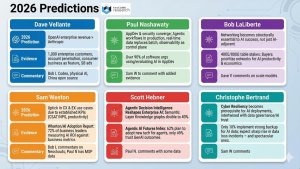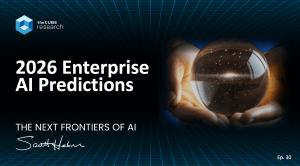ABSTRACT: Artificial intelligence is now central to enterprise strategy, but only 3% of organizations have successfully scaled AI due to a fundamental barrier: untrusted, siloed, and inconsistent data. This research brief, based on Ataccama’s 2025 Data Trust Report and insights from Field Chief Data Officer Larry Hunt, examines why data trust, not models, determines AI success. As AI-generated data accelerates exponentially, Chief Data Officers face mounting pressure to balance innovation, compliance, and operational readiness. The era of reactive governance is over. To win in AI, enterprises must embed trust directly into the data lifecycle. Data trust is no longer optional, it is the currency of enterprise value in the AI economy.
Artificial intelligence is redefining enterprise strategy across every industry. Yet, while nearly every organization is experimenting with AI, very few have successfully operationalized it. Ataccama’s 2025 Data Trust Report reveals a striking paradox: 99% of enterprises are piloting AI initiatives, but only 3% have deployed AI at scale across the organization. This is not a failure of AI models. It is a failure of data readiness.
Based on Ataccama’s Data Trust Report and an interview with Larry Hunt, Field Chief Data Officer at Ataccama, this research brief examines why trusted data, not models, often determines enterprise AI success. It also explores how the Chief Data Officer transforms from a governance steward into a strategic architect of AI-enabled value.
The AI Execution Gap
Executives recognize AI as essential to competitive differentiation across financial services, healthcare, government, manufacturing, and retail. However, scaling AI from pilot to production has proven elusive due to one core issue: the data feeding AI systems is not trusted, explainable, or consistent.
“AI models can train in weeks, but preparing data that is accurate, explainable, and production-ready often takes months. That imbalance is the number one reason AI pilots fail to scale,” said Larry Hunt, Field Chief Data Officer at Ataccama, during an interview supporting this report.
Years of mergers, system proliferation, and fragmented operating models have left organizations managing hundreds or thousands of data sources. In one system, a customer may be listed as active; in another, the same customer is classified as closed. These discrepancies erode the effectiveness of AI models and expose organizations to risk. Financial institutions are today’s most visible example of this challenge, but every industry faces the same underlying barriers.
Data Trust is a Business Imperative
AI doesn’t just require data. It requires accurate, explainable, compliant data and is ready to drive outcomes. The Ataccama Data Trust Report shows that improving data quality is now the top priority for 46% of enterprise data leaders, with more than a third citing it as their biggest challenge.
“Perfect data everywhere isn’t realistic, but perfect data where it counts is non-negotiable. Enterprises that identify those critical areas and govern them strategically will scale AI with confidence,” said Larry Hunt, Field Chief Data Officer at Ataccama, during the interview.
Trusted data is no longer viewed as a technical aspiration. It is a business necessity. It enables faster product launches, cleaner regulatory reporting, and AI that leadership teams can rely on to drive decision-making at scale.
Compliance as Catalyst, Not Constraint
Financial services is often the front line of data regulation, but what is happening in that industry is a preview of what’s coming across every enterprise sector. Nearly half of the Ataccama Data Trust Report respondents noted that regulatory compliance is now a top driver of AI and data modernization initiatives.
Rather than slowing innovation, regulatory requirements such as the EU AI Act, with enforcement beginning in 2026, are accelerating it by forcing enterprises to build transparency, lineage, and accountability into their AI systems.
“The institutions that succeed will find the right balance between speed and trust,” said Larry Hunt, Field Chief Data Officer at Ataccama. “That means cleaning up the data, establishing clear ownership, and ensuring AI systems can explain their decisions. Trust is what earns both customer confidence and regulatory approval.”
Compliance has moved from being a defensive function to being leveraged as a strategic enabler of modernization.
The Evolving Role of the CDO: From Guardian to Growth Leader
A central theme emerging from both the report and the interview is the transformation of the Chief Data Officer role. Modern CDOs must not focus solely on governance but must balance value creation, innovation, and compliance, all while accelerating AI deployment.
“There is no AI strategy without a data strategy,” said Larry Hunt, Field Chief Data Officer at Ataccama. “Governance is not there to say no. Governance is an enabler to accelerate value creation and manage risk. It is the foundation of trusted AI.”
The CDO is a core member of the AI strategy team, tasked with enabling new revenue models, customer experiences, and operational efficiencies while ensuring that AI is transparent, explainable, and trustworthy. We see this as one of the most unforgiving jobs for this AI-enabled application era.
Operationalizing Trust: From Data Cleanup to Data-by-Design
The next wave of enterprise transformation involves embedding trust directly into the data lifecycle. Rather than cleaning data reactively, enterprises are shifting to a model where trust is built in from the start.
This includes:
- Automated data quality checks and vectorization at ingestion
- Data products with clear ownership
- Explainability and lineage are built into the data fabric or across data platforms
- Observability to monitor and remediate issues in real time
“Most governance programs fail because they try to sell governance itself,” said Larry Hunt, Field Chief Data Officer at Ataccama. “The purpose of governance is to enable business outcomes. If governance is not directly connected to value, it will not succeed.”
This mindset shift is enabling enterprises to move from fragmented, reactive processes to data ecosystems that are unified, automated, and continuously trusted.
Financial Services Leads the Way, But Every Industry Will Follow
Financial institutions may be furthest along due to regulatory pressure, but other sectors are rapidly catching up. Healthcare organizations are preparing for AI-driven diagnostics that must meet stringent transparency standards. Governments are modernizing citizen data systems, especially in the US, due to 508 compliance, to power digital services. Manufacturers are deploying AI to optimize supply chains in real-time.
“AI is going to reshape every sector,” said Larry Hunt, Field Chief Data Officer at Ataccama. “Trusted data is the essential ingredient in that transformation, regardless of industry.”
The strategic advantage belongs to organizations that can confidently, repeatedly, and explainably deliver AI outcomes.
Agentic AI and the Next Frontier of Trust
The emergence of agentic AI—where autonomous agents make decisions and act independently—will only increase the importance of trusted data. These systems will interact across domains, query multiple sources simultaneously, and take actions that affect customers, operations, and compliance.
“Trusted data will be required for whatever comes next,” said Larry Hunt, Field Chief Data Officer at Ataccama. “AI will only go as far as data trust allows it to go.”
Agentic AI will require that organizations make trust measurable, auditable, and essential to enterprise AI maturity.
Our ANGLE
The findings of Ataccama’s Data Trust Report, reinforced through executive insight, point to one clear conclusion: there is no AI future without trusted data. Enterprise AI is approaching an inflection point where success will no longer be defined by model size or sophistication, but by the underlying trustworthiness, governance, and data accessibility. Yet despite massive investments in modernization, most organizations continue to operate with deeply fragmented, siloed data architectures, and that reality will not change in the near term. Chief Data Officers are tasked with enabling AI-driven value creation while ensuring compliance and risk mitigation. Still, they are being set up to fail unless they are empowered to deploy new AI-enabled data platforms that proactively manage quality, lineage, and governance at scale. Data trust cannot be treated as an operational afterthought or a compliance checkbox; it must be embedded into the core architecture of how data is produced, shared, and consumed. This is becoming increasingly urgent as AI-generated data fuels a compounding cycle of volume, velocity, and complexity, making the cost of inaction greater than the cost of transformation.
Feel free to reach out and stay connected to Rob through robs@siliconangle.com, read @realstrech on x.com, and comment on our LinkedIn posts.
Disclosure: TheCUBE is a paid media partner for Dynatrace, the sponsor of theCUBE’s event coverage, nor other sponsors have editorial control over content on theCUBE Research, theCUBE, or SiliconANGLE



